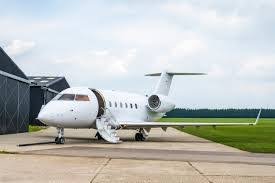The Federal Government, through the Nigeria Customs Service (NCS), has grounded a Gulfstream G650ER jet registered in the United States and owned by a prominent Nigerian bank.
This move marks the start of a broader government crackdown on private jet owners who have not paid import duties totaling billions of naira.
This action comes just two weeks after the NCS began a one-month verification exercise for private jet owners in Nigeria, which started on June 19, 2024, and will conclude on July 19, 2024.
The NCS’s public notice stated that the verification exercise aims to identify private jet operators who illegally imported aircraft without paying the necessary import duties. A similar exercise in 2019 recovered about N2 billion for the government.
During this one-month exercise, at least 80 private jet owners are expected to present their import documents and aircraft registration certificates to the Customs in Abuja.
While the grounding of private jets was initially planned to begin after the verification exercise, some operators’ attempts to export their aircraft prompted the NCS to start the clampdown earlier.
Reports indicate that some operators of foreign-registered private jets were flying their aircraft out of the country to evade the verification process.
The grounded Gulfstream G650ER, which belongs to a bank, was seized at Lagos airport over unpaid import duties estimated at N1.9 billion.
The NCS has contacted the Nigerian Civil Aviation Authority (NCAA) and the Nigerian Airspace Management Agency (NAMA), requesting them to cancel the flight clearance approval for the aircraft.
The luxury jet, operated by Zenith Bank under an arrangement with Aircraft Trust and Financing Corporation Trustee in Delaware, United States, is reportedly linked to unpaid duties on two previously owned private jets, Gulfstream G450 and Gulfstream G550, which have since left the country.
The unpaid duty assessment of N1.9 billion, based on a 2021 verification exercise, might now amount to about N6 billion due to the current exchange rate. Aircraft import duties are computed based on the prevailing exchange rate. The NCAA and NAMA have confirmed receiving instructions to cancel the flight clearance for the Gulfstream G650ER due to contraventions of import duty regulations.
Customs Comptroller General Adewale Adeniyi noted that since the verification exercise began, only a few private jet owners have come forward, with many flying their jets out of Nigeria to avoid scrutiny. The exercise aims to bring more private jets under the law, as many currently operate without paying the required duties.
According to international aviation regulations, private jets operating in a country for an extended period must pay import duties. However, many private jet operators in Nigeria have exploited technical loopholes to avoid these payments, often using Temporary Import Permits (TIP) meant for short-term visits. The TIP, valid initially for 12 months and extendable by six months twice, has been indefinitely extended by several operators to evade import duties. This practice has led to significant revenue losses for the government.
The NCS’s current clampdown aims to rectify this by ensuring all private jet operators pay the mandated import duties. The government could potentially recover close to N100 billion in unpaid duties if the Customs decide to enforce a 25% penalty fee for delayed payments in addition to the statutory 5% import duty.
The verification exercise has been confirmed by NCS National Public Relations Officer, Abdullahi Maiwada. Previously, in 2021, about 17 owners of foreign-registered private jets, including top business figures and leading commercial banks, sought legal action to prevent the grounding of their planes over import duty defaults. This followed the Federal Government’s approval for the NCS to ground 91 private jets for non-payment of over N30 billion in import duties.
The NCS’s 2021 review of private jet import duties, covering aircraft brought into Nigeria since 2006, led to the clearance of 57 jets with commercial charter licenses. However, 29 jets were found liable for import duty payments, and another 62 jets, whose owners did not participate in the verification exercise, were also identified as owing duties.

